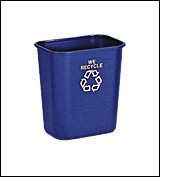 Here is a great LA Times article that describes how a "clean MRF" is processed; you may recall from the Great Recycle Treatise that a clean MRF has the advantage of bringing recycling issues -- and ultimately waste creation issues -- to mind daily.
Here is a great LA Times article that describes how a "clean MRF" is processed; you may recall from the Great Recycle Treatise that a clean MRF has the advantage of bringing recycling issues -- and ultimately waste creation issues -- to mind daily.And don't forget: the simple act of putting recycle trash cans out in your house -- like the $6 basic Rubbermaid recycle bin above -- can greatly increase the amount of stuff that goes into your own recycling. Anywhere you have a "trash" can should also have a recycle bin.

7 comments:
We have great recycling here in Eugene, OR. We no longer have to seperate the recylcing out (except for glass) which makes recycling just as convenient as throwing something in the trash. We have both a garbage and recyling bin under our sink here in my apartment and at least 2/3rds of our waste stream ends up in the recylcing.
If I didn't have an apartment and had some way to run a composter without stinking up the place, the bulk of the 'garbage' waste could go to the composter too, further cutting down on our garbage stream. Most of the stuff that ends up in my garbage is food waste (almost everything else is reclyclable). That and I suppose non-recyclable plastic from packaging.
Thanks for the link to the LAT article. I've often wondered how the unsorted recyclables in my blue bin could be sorted out and actually recycled.
watthead: I'm sure you can find something to do with the food waste. You're in Eugene; there are plenty of people who garden and compost there. One of my friends in Eugene composts, and all her other friends save food waste for her.
Also (and Roger may know more about this), but I seem to remember that it's better to throw away food scraps than to use the garbage disposal in the sink. I have no basis for this, tho, so I'll have to try and do more research.
If you are flush, there is an amazing, electric indoor composter featured on treehugger.com recently; also, there are a number of sealed, small composters that can sit on a patio. They aren't real cheap, but there are several "urban" units at www.composters.com.
I have always liked the look of this one but have never tried it.
Finally, vermicomposting (worms!) can take place in a modest patio box, and provides great food for the potted plants.
Perhaps I need to do that composting series: Indoor, Outdoor, and Worms!
dad i have a question how come pepole did not recycle a long time ago?
I used ot work at a sewage treatment plant adn yes, it absolutely better to compost or even throw away food scraps (or even better feed ot the chickens) because the disposal creates million sof food particles for bacteria to eat and digest. This increases teh BOD or biochemical oxygen demand whicih basically means all the dissolved oxygen in the wastewater gets used by the digesting bacteria and the water goes anaerobic and smelly. Of course, sewage is smelly already...but anaerobic sewage is worse than aerobic. The treatment plant has to aerate that water before it can legally realease it to rivers (usually by trickling filters) otherwise they are fined (and other bad consequences)
I would also comment that Rubbermaid has a terrible track record at fair employment practices etc. Why not just pick up a basket at the thrif tor use a cardboard box for recycling?
Waste Disposal Units
Post a Comment